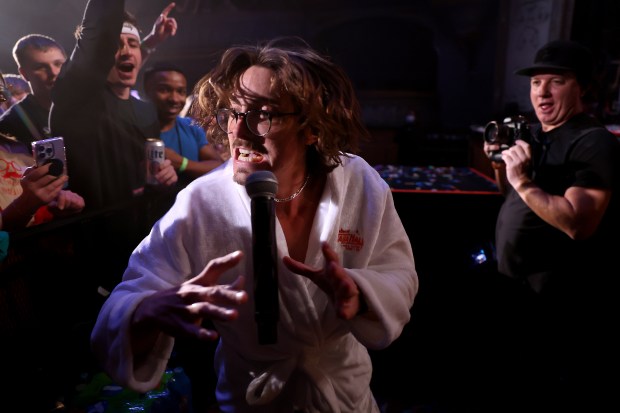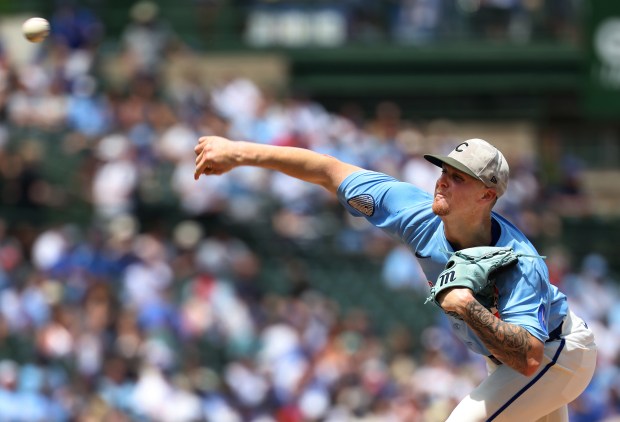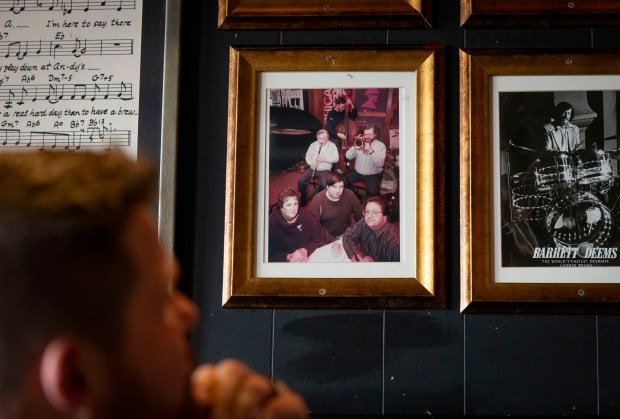Marc Rebillet does not fart around.
Well, maybe a little, when he’s winding up a song, when watching him is akin to watching a car sputter, going zero to 60 in five minutes. He tries stuff, tests sounds, in front of an audience, live. He walks himself into dead ends. Part of the fun is watching him find a way out — most of this time, he does certainly appear to be farting around.
But I see it as sonic reconnaissance. Typically, Rebillet gets categorized as an EDM performer, as in electronic dance music, as in your image of a DJ behind a cache of sound-mixing gear, doing something, we’re not sure exactly what, though music is coming out. That doesn’t quite explain Rebillet’s act. He reworks the job into a one-man jam band; he’s no rapper, there are no hip hop ambitions, but he is nudging contemporary DJs closer to their roots in rap, crafting a party on the fly, keeping a crowd hyped, using whatever’s in front of him. Most importantly, he’s unpolished enough to remind you he’s winging it — now.
To judge by his three sold-out shows over the weekend at Thalia Hall, and the countless YouTube videos of Rebillet playing in the wild — busking on street corners and in city parks, for whomever walks past — he’s tapped into something fresh and human in a profession of computers and concerts preloaded on thumb drives. He’s tapping into older ideas. Such as, improvisation. Despite starting out as as an online star, he’s now an example of the best kind of viral creativity, revealing the creative process in real time.
That hustle is pure Chicago. You wish he could say he’s from Chicago, but alas, he’s from New York City, by way of Texas. Still, to watch him perform in the spiritual seat of improvisation is to be reminded of art acting as a collaboration with audiences. At points in his show, it’s hard not to think of Second City, the avant-garde noisemaking of the Art Ensemble of Chicago, or even the Chicago shadow puppet theater of Manual Cinema, who, despite being structured as performers, are always showing the audience exactly how a show melds together. Also, I think of stream-of-consciousness automatic writing. And the run-and-gun films of the scuzziest indies (particularly John Waters). All of these precedents employ artful farting around. Rebillet likes to say no two shows are alike; he takes the stage without a plan and builds up, on a good night, into something exciting.
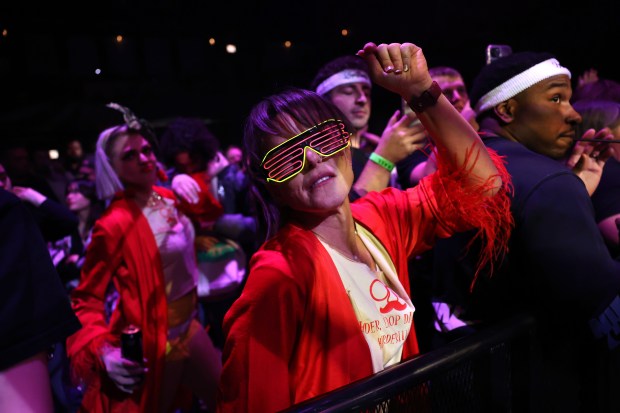
What he’s really doing, though, is satisfying a desire that appears here and there in efficient 21st century pop culture, the need to stay messy and retain a chance of failure.
I’m making this sound more intellectual than it is.
At Thalia Hall, on the second night, he began with a bongo beat pecked out on a synthesizer. Next, he added some gibberish scatting, mumbled into his microphone. Then he layered in hi-hat and the snap of a clap. Finally, of course, bass. When Rebillet began to do kind of thing as a professional career, he studied up on jazz theory and it’s served him well: He finds motifs in whatever song he’s crafting, returns to them, scatters them, locates places to upend the material entirely, then returns us to step one, in surprising ways. That the music itself he’s creating is not always that interesting is almost besides the point. “What’s the vibe tonight?” he asked the crowd, interviewing individual audience members like he’s a street reporter. They didn’t have much to say, just witless variations of “party!” and “get drunk!” But Rebillet repeated it to himself, again and again, using those words into a song until the words lost all meaning. Then just as the rhythm was finding its footing, he braked sharply and screamed a story about wanting liquor brought to his hotel room because he planned to have his blood replaced with beer — OK, now one two three, party!
When it works, Rebillet makes exhilarating nonsense, a missing link between EDM, jazz and stand-up comedy — indeed, Rebillet is fast to credit the entire idea for act to being inspired by the comedian Reggie Watts, who creates songs on the fly, albeit cerebrally.
Rebillet is called the Loop Daddy.
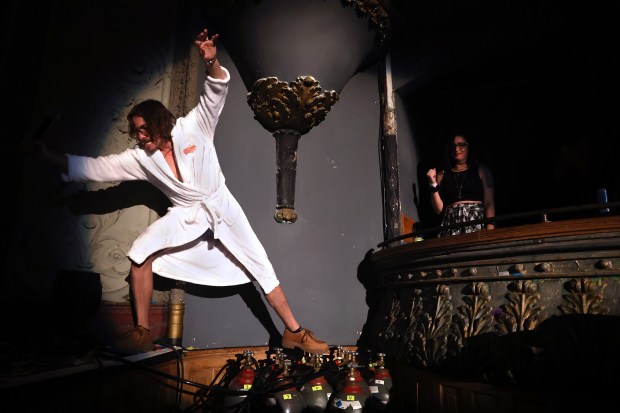

The Thalia Hall audience chanted it. The name refers to digital looping, recording a sound or playing a bit of something, recording it right there and then, and letting it cycle, loop; layer in enough loops of sound and you have musical production as performance. Rebillet plays piano throughout his shows, taps out beats on drum machines, sorts through a table of odds and ends, train whistles, squeaking rubber chickens. He pauses for a bit of plaintive piano balladry (he’s classically trained), or the grind of a slow burn. One song in Pilsen had the bass strut of late ‘70s Parliament, only to segue into a Wurlitzer-like organ solo like a funky seventh-inning stretch. Another song began with Rebillet dropping a rattle repeatedly and taping the sound like an obsessed Foley artist.
Rebillet bills his shows as a “one-man improvised meltdown,” and it’s spot-on. Just as he does on YouTube, he comes out in a bathrobe and boxers (then strips down to underwear and stays that way for the rest of the show). He has long stringy locks, thick eyeglasses and Mephistophelean facial hair that suggests porn actor, circa 1974. He dances with a hunch and it can be hard to tell is if he’s grimacing or smiling way too big. Late in the show that I saw, he ordered the audience to crouch down then screamed at the one guy who was not listening — “GET DOWN, SIR!” He leapt into the audience with a bottle of champagne, uncorked it there and then and sprayed the contents on the crowd.
He’s overcompensating in a way for the fact that performance art loses its surprise in front of a paying audience. Rebillet has been doing variations of this show for most of a decade, albeit online. He gained traction during the pandemic, when videos of him crafting songs in his apartment became a regularly charming balm to social distancing. He would crowdsource numbers, flashing his phone number and taking requests for the topics of his songs. In a more formal concert, he approximates this by stopping periodically to play an assortment of notes and ask the audience which one it likes best.
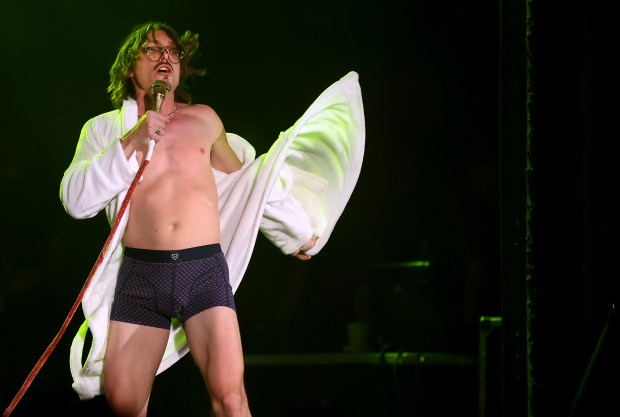
As the pandemic lifted, he began setting up on street corners around New York City. The videos of this are fascinating: We watch from just over his shoulder. He tinkers a bit with his keyboard. He samples sounds. He talks to no one. People rush past too busy to pay attention, until one or two people do stop. Then more come. Then more. A crowd forms. Inevitably, there’s a block party. He’s had violinists and guitarists and singers stop and jam; once a high school marching band appeared out of nowhere. You see moments of uncertainty, nuggets of inspiration and flashes of genuine joy. He tried this on Michigan Avenue last January: A little girl named Hazel in a pink coat stopped and said she wanted a dog. He worked it into a funk chant: “Hazel needs a dog! Hazel needs a dog!”
Eventually Chicago police came.
Rebillet charmed his way into playing 10 more minutes.
According to Warhol’s math, that should give him about another five minutes of fame. But I think Rebillet could extend it. He knows how to “Yes, and …” like the best Second City comic, never turning around mid-performance to adjust but rather add to and amend what’s already working. For the finale he had a conversation with Satan, led a chant of “(expletive) Donald Trump,” veered into Chicago house and something about a flamingo eating his grandmother. None of it made a lot of sense, and everything came with quote marks fixed around it. Everything but Rebillet’s commitment to showing how creativity works.
That part’s no joke.
cborrelli@chicagotribune.com


